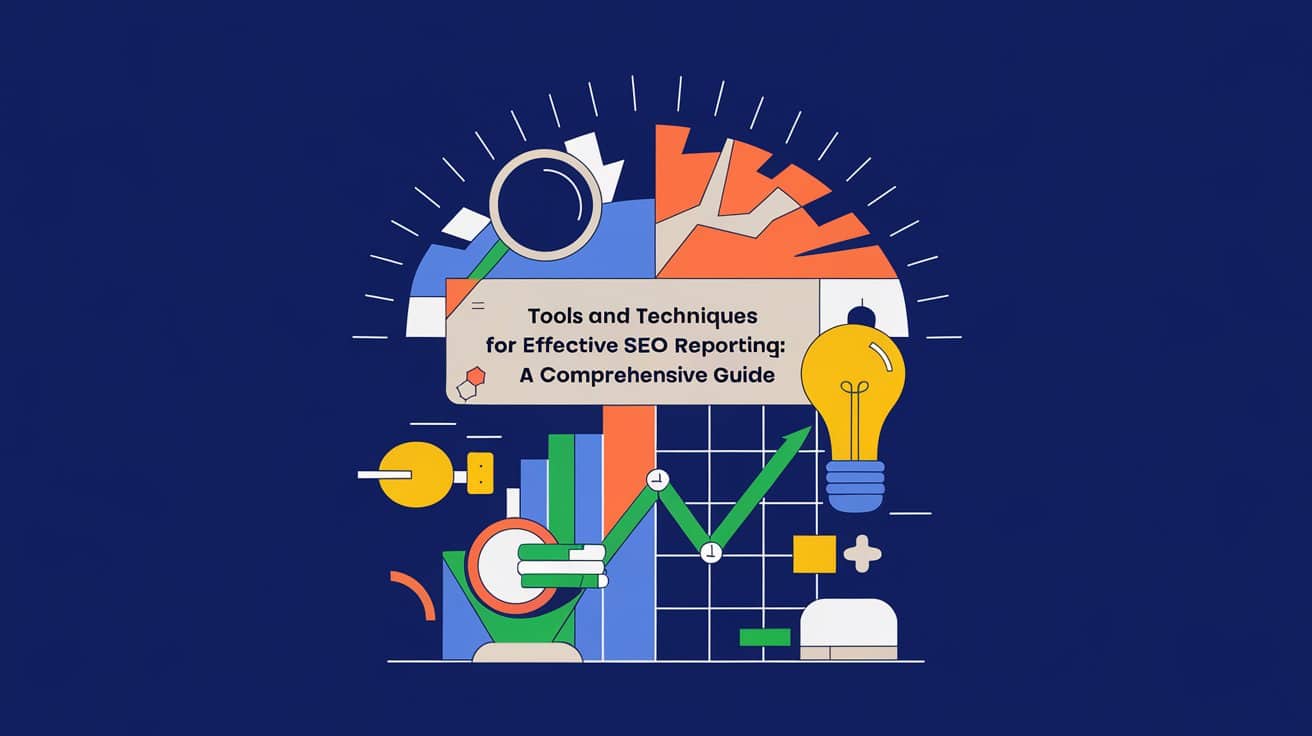Tools and techniques for effective SEO reporting is a vital aspect of any SEO campaign. It involves analyzing and presenting data in a way that is easily understandable to clients or stakeholders. Effective SEO reporting is essential for determining the success of SEO strategies and identifying areas that need improvement.
To achieve effective SEO reporting, it is crucial to use the right tools and techniques. SEO reporting tools can help in generating reports that provide insights into website performance, keyword rankings, traffic sources, and much more. These tools can help in identifying areas that need improvement and tracking progress over time.
Furthermore, techniques such as data visualization, storytelling, and benchmarking can be used to enhance the effectiveness of SEO reporting. Data visualization involves presenting data in a way that is easy to understand and interpret. Storytelling, on the other hand, involves presenting data in a narrative format that is compelling and engaging. Benchmarking involves comparing data against industry standards to determine the effectiveness of SEO strategies. Using these tools and techniques can help in achieving effective SEO reporting and ultimately, improving website performance.
Understanding SEO Reporting
SEO reporting is a crucial aspect of any SEO campaign. It helps to track the progress of a website’s SEO efforts and identify areas that require improvement. SEO reports can provide valuable insights into a website’s traffic, rankings, and overall performance. They are used to evaluate the effectiveness of an SEO campaign and make data-driven decisions.
When it comes to SEO reporting, it is essential to understand what data to include in the report. The report should provide a clear and concise overview of the website’s performance. It should include data on website traffic, keyword rankings, backlinks, and other relevant metrics. The data should be presented in a way that is easy to understand and interpret.
One of the most critical aspects of SEO reporting is tracking the right metrics. There are many different metrics that can be tracked, but not all of them are relevant to every website. For example, a local business may not need to track global search volume, but they may want to track local search volume. It is important to identify the metrics that are most relevant to the website and track them consistently.
Another important aspect of SEO reporting is setting clear goals. The report should include goals for the website’s traffic, rankings, and other relevant metrics. The goals should be specific, measurable, achievable, relevant, and time-bound. By setting clear goals, it is easier to track progress and make data-driven decisions.
In summary, SEO reporting is a critical aspect of any SEO campaign. It helps to track progress, identify areas for improvement, and make data-driven decisions. When creating an SEO report, it is essential to track the right metrics, present the data in a clear and concise manner, and set clear goals. By doing so, it is easier to evaluate the effectiveness of an SEO campaign and make data-driven decisions.
Key Metrics in SEO Reporting
To effectively measure the success of SEO campaigns, it is important to track and analyze key metrics. These metrics provide valuable insights into the performance of SEO strategies and help identify areas for improvement.
Traffic Metrics
Traffic metrics are an essential component of SEO reporting. They provide insights into how many visitors are coming to a website and how they are getting there. Organic traffic is a key metric to track, as it indicates the number of visitors coming to a website from search engine results pages (SERPs). Other traffic metrics to consider include referral traffic, direct traffic, and social traffic.
Ranking Metrics
Ranking metrics are also important to track, as they provide insights into how well a website is ranking on search engine results pages. Keyword rankings are a key metric to track, as they indicate how well a website is ranking for specific keywords. Other ranking metrics to consider include search engine rankings and domain authority.
Conversion Metrics
Conversion metrics are perhaps the most important metrics to track, as they provide insights into how well a website is converting visitors into leads and customers. Conversion metrics to track include the number of leads generated, the conversion rate, and revenue generated from SEO campaigns.
Tracking these key metrics is essential to effectively measure the success of SEO campaigns. By regularly reviewing and analyzing these metrics, businesses can identify areas for improvement and adjust their SEO strategies accordingly.
SEO Reporting Tools
When it comes to SEO reporting, there are several tools that can help you track and analyse your website’s performance. Here are some of the most popular SEO reporting tools:
Google Analytics
Google Analytics is a free web analytics service offered by Google that helps you track website traffic and user behaviour. With Google Analytics, you can view reports on your website’s traffic sources, user demographics, and behaviour on your site. This tool is essential for SEO reporting as it provides valuable insights into how your website is performing and where you need to improve.
Google Search Console
Google Search Console is another free tool offered by Google that helps you monitor your website’s presence in Google search results. With Google Search Console, you can track your website’s search performance, see which queries are driving traffic to your site, monitor your backlinks, and more. This tool is essential for SEO reporting as it provides valuable data on how your website is performing in search results.
SEMrush
SEMrush is a paid SEO tool that offers a range of features to help you improve your website’s performance. With SEMrush, you can track your website’s ranking in search results, monitor your backlinks, conduct keyword research, and more. This tool is essential for SEO reporting as it provides detailed insights into your website’s performance and helps you identify areas for improvement.
Ahrefs
Ahrefs is another paid SEO tool that offers a range of features to help you improve your website’s performance. With Ahrefs, you can track your website’s ranking in search results, monitor your backlinks, conduct keyword research, and more. This tool is essential for SEO reporting as it provides detailed insights into your website’s performance and helps you identify areas for improvement.
Moz
Moz is a paid SEO tool that offers a range of features to help you improve your website’s performance. With Moz, you can track your website’s ranking in search results, monitor your backlinks, conduct keyword research, and more. This tool is essential for SEO reporting as it provides detailed insights into your website’s performance and helps you identify areas for improvement.
Overall, these SEO reporting tools are essential for tracking and analysing your website’s performance. By using these tools, you can identify areas for improvement and take action to improve your website’s SEO.
Keyword Research in SEO Reporting
Keyword research is a crucial aspect of SEO reporting. It is the process of identifying the most relevant keywords and phrases that people use to search for a particular topic or product. This process helps to optimize the content for search engines and improve its visibility in search results.
To conduct effective keyword research, SEO reporters use various tools such as Google Keyword Planner, SEMrush, and Ahrefs. These tools provide information on the search volume, competition, and relevance of different keywords. They also suggest relevant keywords that can be used to optimize the content.
Once the relevant keywords are identified, SEO reporters use them strategically in the content. They ensure that the keywords are included in the title, headings, meta descriptions, and throughout the content. This helps search engines to understand the content and rank it higher in search results.
It is important to note that the relevance of the keywords is crucial in SEO reporting. Using irrelevant keywords can lead to poor search rankings and low traffic. Therefore, SEO reporters must ensure that the keywords used are relevant to the content and the target audience.
In conclusion, keyword research is a critical aspect of SEO reporting. It helps to identify the most relevant keywords and phrases that can be used to optimize the content for search engines. SEO reporters must use appropriate tools and ensure that the keywords used are relevant and strategically placed throughout the content.
Technical Aspects of SEO Reporting
When it comes to SEO reporting, technical aspects play a crucial role in determining the effectiveness of the report. Two of the most important technical aspects to consider are site speed and broken links.
Site Speed
Site speed is an important factor in SEO as it affects user experience and can lead to higher bounce rates. Slow loading pages can also negatively impact search engine rankings. Therefore, it is important to regularly monitor site speed and take steps to improve it where necessary.
Tools such as Pagespeed Insights can provide valuable insights into a site’s speed performance. This tool analyses a page’s content and provides suggestions for improving speed. Core Web Vitals is another tool that can be used to measure site speed and user experience. It provides metrics such as loading time, interactivity, and visual stability.
Broken Links
Broken links are links that no longer work and lead to a 404 error page. These can negatively impact user experience and search engine rankings. Therefore, it is important to regularly check for broken links and fix them where necessary.
Tools such as Ahrefs and SEMrush can be used to identify broken links on a site. These tools can also provide suggestions for fixing broken links and improving overall site health.
In summary, monitoring site speed and fixing broken links are important technical aspects of SEO reporting. By regularly monitoring and improving these factors, site owners can improve user experience, search engine rankings, and overall site health.
Competitor Analysis in SEO Reporting
Competitor analysis is an essential aspect of SEO reporting. It helps businesses understand their competitors’ strategies and the keywords they are targeting. By analyzing competitors’ SEO strategies, businesses can adjust their own strategies to gain a competitive edge.
One effective way to perform competitor analysis is to use SEO reporting tools. These tools provide information on competitors’ rankings, backlinks, and keywords. Businesses can use this information to identify gaps in their own SEO strategies and adjust accordingly.
Another technique for competitor analysis is to conduct a content gap analysis. This involves analyzing competitors’ content to identify topics that they cover but the business does not. By identifying these gaps, businesses can create content that fills these gaps and attracts more traffic.
Businesses can also analyze their competitors’ social media presence to gain insights into their social media strategies. This can include analyzing the types of content they post, the frequency of their posts, and their engagement levels. By analyzing these factors, businesses can adjust their own social media strategies to better compete with their competitors.
Overall, competitor analysis is a crucial component of effective SEO reporting. By analyzing competitors’ strategies, businesses can adjust their own strategies to gain a competitive edge. Using SEO reporting tools, conducting content gap analysis, and analyzing social media presence are all effective techniques for performing competitor analysis.
Reporting SEO Strategy and Campaigns
Reporting SEO Strategy
Reporting on SEO strategy is an essential aspect of effective SEO reporting. It helps to track the progress of the SEO strategy and make necessary adjustments to achieve the desired goals. The report should include a summary of the SEO strategy, the goals, and the performance of the strategy.
The summary of the SEO strategy should include the techniques used to improve the website’s ranking, such as keyword research, on-page optimization, and link building. The goals of the SEO strategy should be clearly defined and measurable. The report should show whether the goals have been achieved or not.
The performance of the SEO strategy should be measured using relevant metrics such as organic search traffic, keyword rankings, and conversion rates. The report should show the progress made towards achieving the goals and any areas that need improvement.
Reporting SEO Campaigns
Reporting on SEO campaigns is crucial in determining the effectiveness of the campaigns. The report should include a summary of the campaign, the goals, the results, and the performance of the campaign.
The summary of the SEO campaign should include the techniques used to promote the website, such as content marketing, social media marketing, and paid advertising. The goals of the campaign should be clearly defined and measurable. The report should show whether the goals have been achieved or not.
The results of the SEO campaign should be measured using relevant metrics such as website traffic, engagement rates, and conversion rates. The report should show the progress made towards achieving the goals and any areas that need improvement.
In conclusion, reporting on SEO strategy and campaigns is crucial in achieving the desired results. The report should be clear, concise, and include relevant metrics to track the progress of the strategy and campaigns.
Client Communication in SEO Reporting
Effective communication with clients is essential for successful SEO reporting. Clients need to understand the progress of their SEO campaigns and the impact of SEO strategies on their business. Therefore, SEO professionals need to use clear and concise language when communicating with clients and other stakeholders.
One effective technique for client communication is to include a summary of the SEO report at the beginning of the report. This summary should include the most important metrics and findings, such as keyword rankings, traffic, and conversions. This will help clients to quickly understand the report and focus on the key points.
Another technique for effective client communication is to use visual aids such as tables and graphs to present data. This can help clients to understand complex data more easily and quickly. For example, a table can be used to show keyword rankings over time, while a graph can be used to show changes in traffic over time.
It is also important to explain technical terms and concepts in plain language. Clients may not be familiar with technical terms such as “backlinks” or “metadata,” so it is important to explain these terms in a way that is easy to understand.
Finally, it is important to be responsive to clients’ questions and concerns. Clients may have questions about the report or the SEO strategy, and it is important to address these questions in a timely and professional manner. This will help to build trust and confidence with clients, and will help to ensure that the SEO campaign is on track to meet its goals.
In conclusion, effective client communication is essential for successful SEO reporting. By using clear and concise language, visual aids, and responsive communication, SEO professionals can help clients to understand the progress of their SEO campaigns and the impact of SEO strategies on their business.
Conclusion
In conclusion, effective SEO reporting is a crucial aspect of any SEO campaign. It allows businesses to gain insights into their website’s performance, identify areas of improvement, and make data-driven decisions.
Through SEO analysis, businesses can gain a better understanding of their website’s traffic, user behaviour, and search engine rankings. This information can be used to identify opportunities for growth and optimize their website accordingly.
By employing tools such as Google Analytics and Google Search Console, businesses can track their website’s performance and gain valuable insights into their audience’s behaviour. This data can be used to identify areas of improvement and make data-driven decisions to improve their website’s performance.
In summary, effective SEO reporting is an essential component of any successful SEO campaign. By analyzing data and gaining insights into website performance, businesses can make informed decisions to optimize their website and improve their search engine rankings.







